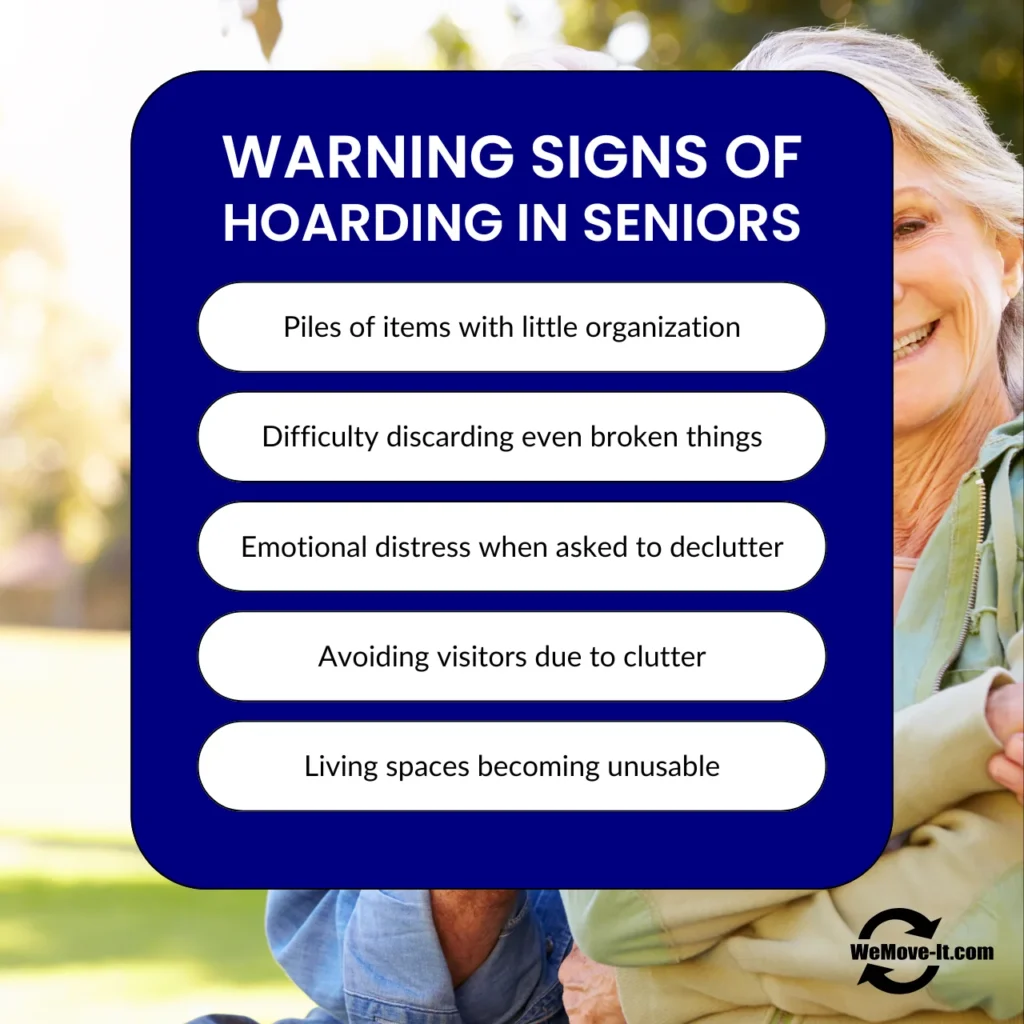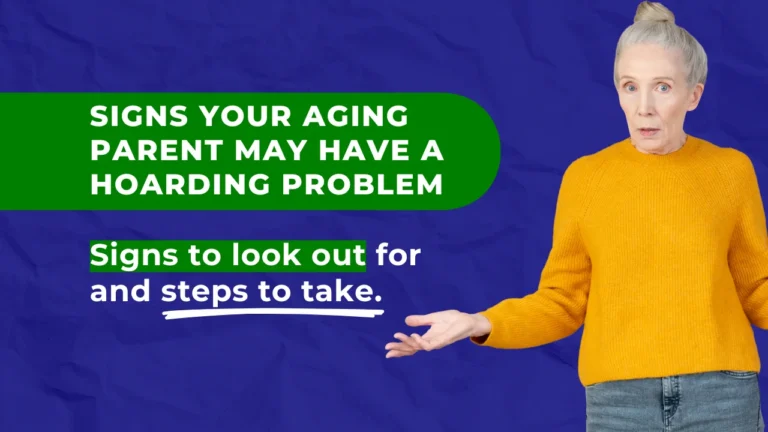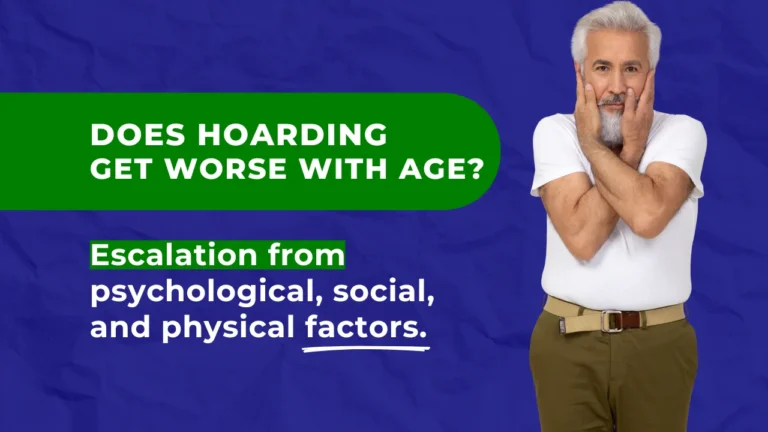While hoarding affects people of all ages, it becomes particularly concerning when it occurs in the elderly. As people age, certain factors can contribute to the development or worsening of hoarding behaviours, making it challenging for them and their families to manage. Understanding the causes of hoarding in the elderly is key to addressing the problem and providing the right support.
Emotional Attachments and Sentimental Value
As you age, it’s natural to accumulate items that hold sentimental value. However, for some elderly individuals, these emotional attachments can become overwhelming. They may find it difficult to part with belongings because each item represents a memory, a person, or a significant life event.
For a senior, the idea of letting go can feel like losing a part of themselves or their history. This emotional attachment can lead to hoarding behaviours as they struggle to separate from possessions that remind them of the past, a pattern often seen in those experiencing hoarding signs in aging parents.

Cognitive Decline
As cognitive functions decrease, decision-making and organizational skills can become impaired. You might notice that an older loved one is having trouble sorting through their belongings and making choices about what to keep and what to discard. This cognitive decline can result in a gradual accumulation of items, as they may feel uncertain or anxious about making the wrong decision. In fact, researchers have explored the connection between hoarding and dementia, highlighting how cognitive impairments contribute to excessive clutter.

Over time, this can lead to hoarding, as they become overwhelmed by the growing clutter.
Depression and Anxiety
Mental health issues, such as depression and anxiety, are common among the elderly and can be closely linked to hoarding behaviours:
- Depression can lead to a lack of motivation and energy, making it difficult for an individual to manage their belongings. You may notice that they start to withdraw from activities they once enjoyed and begin to isolate themselves, allowing clutter to build up around them.
- Anxiety can cause them to feel a heightened sense of responsibility for their possessions, fearing that they may need something in the future or that they will regret discarding it.
These mental health challenges can create a cycle of hoarding that becomes increasingly difficult to break.
Grief and Loss
Experiencing the loss of a loved one can be a major trigger for hoarding in the elderly. When someone close to them passes away, they may turn to their possessions as a way to cope with the grief.
Holding onto items that belonged to the deceased or that remind them of their lost loved one can provide a sense of comfort and connection. However, this can also lead to hoarding as they find it too painful to part with anything that has sentimental value. The fear of losing more can drive them to hold onto even more items, compounding the problem.
Physical Limitations
As mobility decreases, it can become challenging to maintain a clean and organized living space. You might notice that your elderly parent is unable to move around easily or perform tasks that require physical effort, such as sorting through piles of belongings or carrying items to the trash. This can result in clutter accumulating over time. Physical limitations can also make it difficult for them to recognize when hoarding has become a problem, leading to further accumulation.
Fear of Scarcity
A fear of scarcity can be deeply ingrained in some elderly individuals, especially those who lived through difficult economic times like the Great Depression or war periods. This fear can drive them to hoard items they believe may be needed in the future, even if those items have little value or are no longer useful.
You may see them holding onto things like old newspapers, broken appliances, or worn-out clothing, convinced that these items might come in handy someday. This mindset can lead to excessive hoarding, as they are constantly trying to prepare for an uncertain future.
Social Isolation
Social isolation is another factor that can contribute to hoarding in the elderly. When someone becomes isolated from friends, family, and their community, they may turn to their belongings for comfort and companionship. This is one reason why hoarding tends to worsen with age, as seniors face increased loneliness and emotional dependence on possessions.

You might find that they begin to accumulate more items to fill the emotional void left by a lack of social interaction. Over time, this can lead to severe hoarding, as they rely on their possessions to provide a sense of security and stability.
Lack of Support System
Without regular check-ins from family or friends, an elderly person may struggle to keep their living space organized and free from clutter.

For families seeking solutions, there are effective ways to help seniors with hoarding that focus on compassionate support and gradual decluttering. You may notice that they begin to hoard as a way to cope with the loneliness and lack of assistance in managing their home. Without a support system to help them sort through their belongings and encourage them to make decisions about what to keep and what to discard, the hoarding can quickly spiral out of control.
Trauma and Past Experiences
Trauma and past experiences can also be underlying causes of hoarding in the elderly. Those who have experienced significant trauma, such as abuse, neglect, or a major life-changing event, may turn to hoarding as a way to regain control over their environment.
You might observe that they hold onto items that represent safety and security, even if those items have no practical use. This behaviour can be a coping mechanism to deal with unresolved emotions from their past, leading to hoarding as they attempt to create a sense of stability in their lives.
Identity and Self-Worth
For some elderly individuals, hoarding can be tied to their sense of identity and self-worth. As people age, they may feel that they are losing their sense of purpose or value, especially if they are no longer working or have lost loved ones. Holding onto possessions can become a way to assert their identity and maintain a connection to their past.
You may see them collecting items that represent who they were or what they accomplished during their lives. This attachment to objects as a source of self-worth can lead to hoarding, as they struggle to let go of things that they believe define them.
Compassionate Help for Hoarding is Available
Understanding the causes of hoarding in the elderly is the first step in providing the right support and assistance. Whether it’s emotional attachments, cognitive decline, or any other factor, addressing the underlying issues is essential to helping your loved one live in a safer and more comfortable environment.
If you’re concerned about an elderly loved one who is struggling with hoarding, it’s important to approach the situation with empathy and understanding. Help is also available: at WeMove-It.com, we offer efficient and compassionate hoarder cleanup services in Toronto, Burlington and the Greater Hamilton area that can make a huge difference in your loved one’s life. To schedule your free estimate, call 844-866-8348.




